
Maurizio Sarri arrived at Chelsea this summer with one of the most intriguing backgrounds in football.
He is a former banker who for years combined working in amateur football with his day job as a foreign currency trader.
The international reputation he now enjoys has been built slowly and steadily from humble beginnings in the eighth tier of Italian football, almost 30 years ago.
BBC Sport met some of those who know Sarri best to find out more about the making of the Chelsea boss, who on Saturday became the first manager this season to inflict a Premier League defeat on champions Manchester City.
They spoke of his remarkable superstitions, his heavy smoking, his determination and the innovations that have marked him out as one of the world's best.
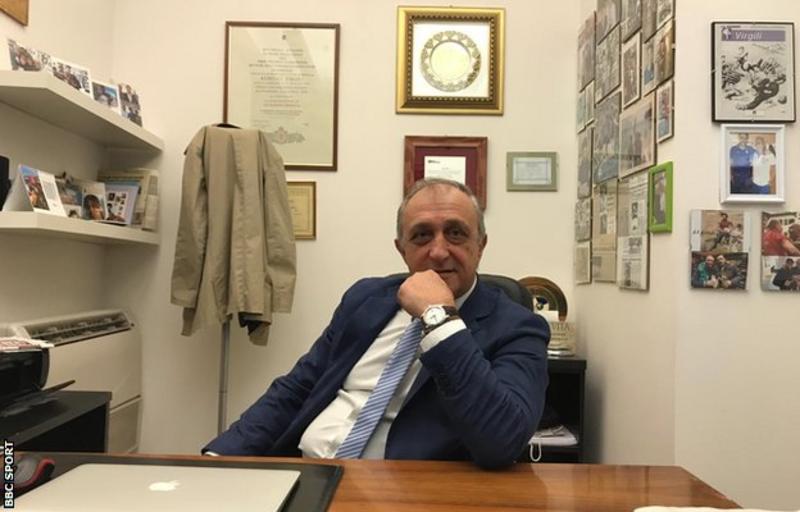
Aurelio Virgili says Sarri was "an excellent banker"
During his years as an amateur footballer, player-manager and then manager, Maurizio Sarri, now 59, worked for a bank - Banca Toscana. His job was based in Florence but took him to London, Germany, Switzerland and Luxembourg.
Aurelio Virgili worked with him.
It's a beautiful thing. Someone who was way down there with this huge potential has managed to show everyone what he is capable of. If you go back in your mind and think where he was and what he has become, it's a fairytale.
Maurizio was an excellent banker, one of the best. He was the same in banking as he is in sport; precise, a person who approaches everything in a scientific way.
He wasn't someone who had a background in finance, but he started from scratch and achieved excellent results. At the same time, while working with us, he was coaching local amateur sides.
He combined the two until, having gradually climbed up the football ladder as well, he reached semi-pro level and decided to take the plunge and go full-time.
It was a big gamble, but because of his passion he said to himself: 'OK, I might have to make a few sacrifices but I'll give it a go.' Credit to him because I don't know how many other people would have made the same choice.
Maurizio deserves all the success he has had. He has earned it. He could have continued to work here at the bank, whilst carrying on coaching, with a certain financial security, but he is someone who has no fear.
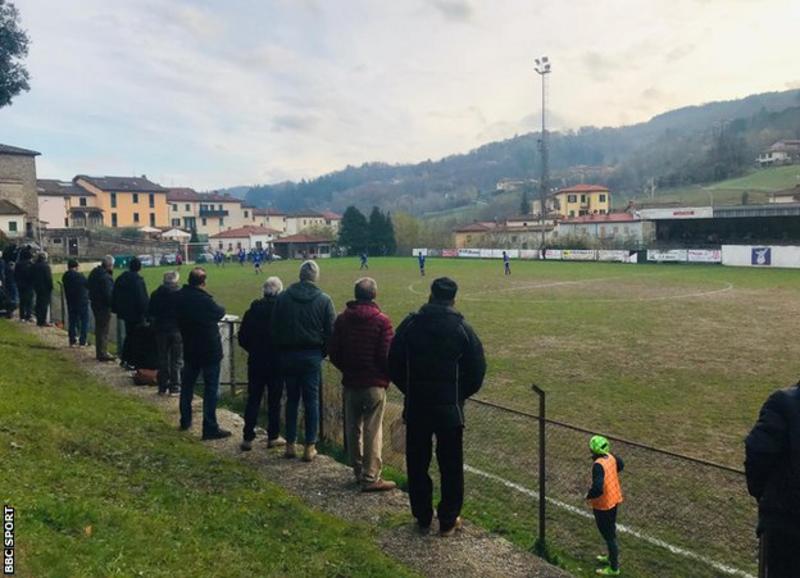
Stia is a small town in Tuscany, with a population of around 2,500
Sarri's first job in management came at Stia, an amateur side in the eighth tier of Italian football. Having been signed as a player, he took over as coach after the manager was sacked during the 1990-91 season.
Luciano Innocenti played as a striker.
Maurizio was born to be a manager. But still, no-one thought he would get to where he has today.
As a player, he was physical. Tough and mean. An old-school defender. I remember the last goal that he scored, a header. He took his shirt off as he celebrated in front of the stands with the crowd cheering.
In those days it was a very physical game. Nowadays football is a bit more tactical and measured. As our coach, Maurizio made a difference with his determination, his desire and his hunger. He studies the game. I'm convinced that at Chelsea he's always reading, watching, making notes. He lives for football.
He was very superstitious. I remember when we would be driving to a game in the car and he'd always light a cigarette when we were going round a particular corner in the road.
He smoked a lot, as he does now. He could also get angry sometimes. But even in difficult times he would get over the obstacles.
Later we would also play against his teams. They were bastards to play against - bastards!
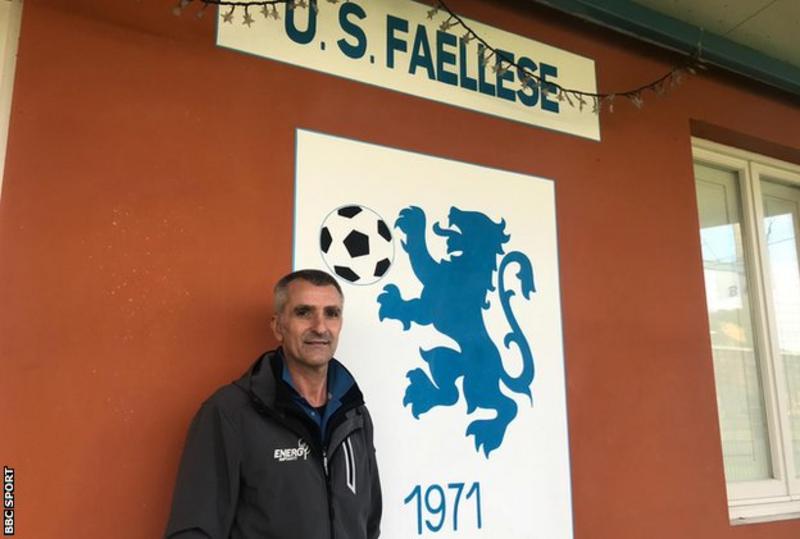
Simone Simonti played as a midfielder under Sarri at Faellese
In 1991, Sarri moved on to Faellese, another small Tuscan team were playing in the division above Stia - in Italy's seventh tier. Within two seasons he would win them promotion. Andrea Buset and Simone Simonti played as midfielders.
Andrea Buset
Maurizio had a number of different superstitions. Firstly there was the smoking. He was always smoking. Nowadays you can't smoke on the bench; back then you could. He would put one cigarette out and then light up another straight away.
And he was always dressed in black. He only stopped that relatively recently - he dressed like that at all his old teams. It was his lucky colour.
When we were winning games he would always repeat the exact same rituals. He would take the same route to the stadium, he would dress the same, he would put one particular foot in front of the other, that sort of thing.
Simone Simonti
We knew everything about our opponents, and I mean everything - technical details, tactics, information on individual players. For that time it was unthinkable that a coach at our level would have that amount of information on another team.
Under Maurizio we played a 3-5-2, with zonal marking. We were the only team at that level who played football like that. At that time it was the dawn of zonal play, which in Italy began with Arrigo Sacchi at AC Milan. Maurizio did the same with us.
It was a template, a mould for 'SarriBall'. Twenty-five years ago we were already using the same tactics at corners and free-kicks that Maurizio has since brought up the leagues.
His great strength was in creating a group that were friends as well as team-mates. He was able to get the best out of every player and motivate each individual. To this day, we still get together as a team and go out for dinner because we have all stayed friends.
Make no mistake - he would get angry very often, but they were fits of rage that would always bring about something positive. They were not outbursts that would leave a negative mark on the dressing room. It was all about constructive criticism.
He is able to bring joy to the surface. And you see that express itself on a matchday.
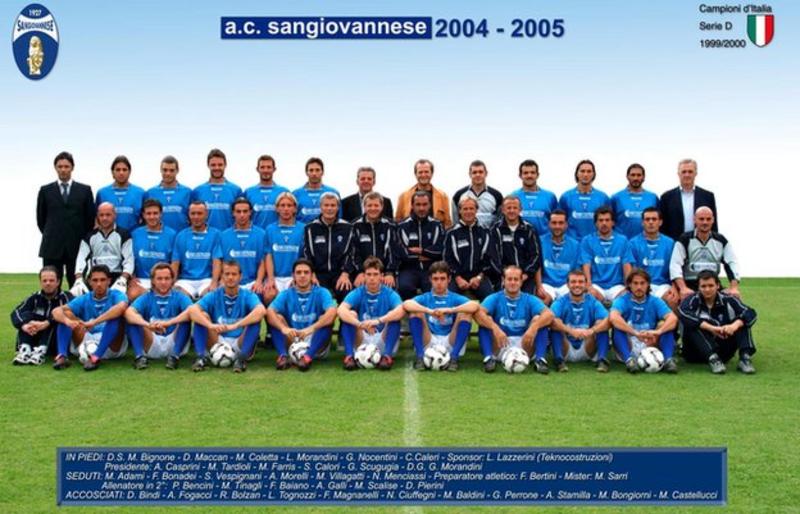
Sarri (middle row, eighth from left) would make players use varnish to turn their coloured boots black
In the early 2000s, over a decade after his first job in coaching, Sarri decided to quit his job as a banker and focus full-time on football. In 2003, he was given his biggest appointment to date with Sangiovannese. In what was his eighth job in management, he won promotion to the old Serie C1 - one league below Serie B.
Simone Calori was defender and club captain.
Maurizio arrived from the amateur leagues but already he had a reputation as a visionary and we soon saw that for ourselves.
It was football from the future. He would do tests for everything - psychological analysis, physical tests, he would take every minor details into account. For that level of the game, it was completely alien.
Sometimes we would look at each other and think it was all a bit too much, but we were a group that wanted to learn and grow. We listened to everything he said. We did whatever he said. The results we got were incredible.
He knew everything about everyone. Once he told me: 'Simone, on Sunday you're going to be marking a striker who has just split up with his wife. So as soon as you get out on the pitch, say something about his wife, get inside his head!'
He knew every minor detail about our opponents. It really was remarkable.
And then there were the superstitions. He didn't like the number 17 so if in a hotel he was given 17 as a room number he would be up and down the corridors looking for another room.
He also didn't want us to wear coloured boots. That was something he had to get used to later as he went up the divisions, but in those days he made us use varnish on ours boots to turn them black.
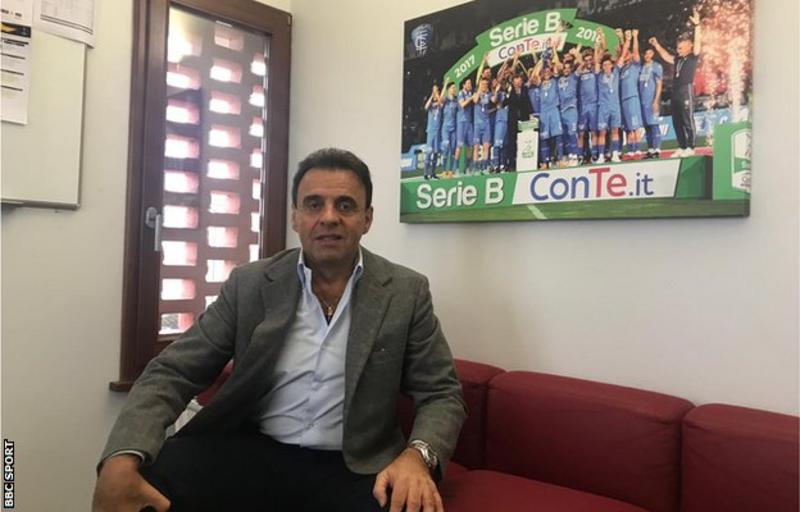
Fabrizio Corsi appointed Sarri as Empoli boss in 2012
Sarri would leave Sangiovannese for Pescara - the first of eight appointments in Italy's second division before arriving at Empoli. With them Sarri finally reached Serie A, winning promotion to the top flight in 2013-2014, aged 55.
Fabrizio Corsi is Empoli's president. He appointed Sarri in 2012.
Taking a club like this into Serie A is an unbelievable achievement given the size of those we are up against.
It was here that Maurizio fine-tuned his style of play, this idea of high-tempo, one-touch football combined with a compact line-up, a high defensive line with an emphasis on going forward, getting the ball out wide in advanced positions or at times via the playmaker.
Up until then his footballing knowledge had been too great for the players that he had managed. The level was too limited for his expertise.
Sarri is seen as a professor of the game, an expert who is closely followed by athletes and non-athletes alike because he is a manager who gave so much to us, not only to the club but also to the city.
It's a beautiful story. And it's a happy one. But above all it's also a story that could serve to help others - those who are trying to follow their dreams and having trouble expressing their own ideas.
I don't know if it could ever happen again, but it could act as an example, as a guiding star, to many young managers out there, and even to many older ones too, because Maurizio made his breakthrough quite late.
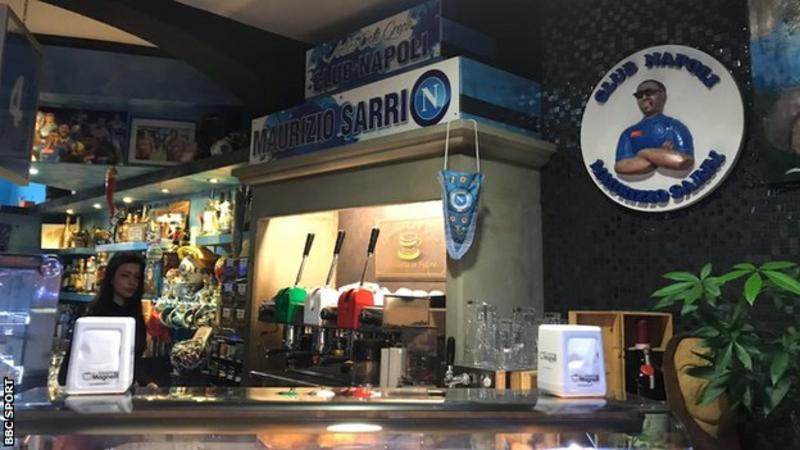
Sarri was in charge of Napoli for three seasons
From Empoli, Sarri moved on to take over at Napoli. It was by far his biggest job to date, in the city where he was born. His work there would propel his growing reputation further still.
In 2015-16, his first season in charge, Napoli finished second behind Juventus. They finished third the following year, then runners-up again, before Sarri left for Chelsea at the end of 2017-18.
Agostino Iaiunese runs L'Antico Caffe Greco, a Napoli supporters' bar in Figline Valdarno, Sarri's hometown in Tuscany.
In Naples, Maurizio is viewed like Diego Maradona. He's seen as a leader. The people of Naples have a really strong bond with Maurizio. He's a figurehead for us - he defended us as a city, as a set of supporters, as Neapolitans - as well as always doing brilliantly with us on the pitch.
For me, no-one else will do at Napoli what Maurizio did there.
When his family moved to Figline from Napoli, they lived right above this bar; this was his home. It's a huge coincidence that this fan club is now here.
For us we have a double sense of pride, both because Maurizio was Napoli manager and because he's from Figline. For us, Maurizio is the best.
He's genuine, that's why people took to him straight away. He speaks his mind - what you see is what you get with him. In football we are used to seeing people in ties and suits. Not with Maurizio.
If he has something to say, he'll say it, no matter what. He's the only manager in the world who stopped a game because of discriminatory chants against Neapolitans. He said: 'Either you make them stop chanting or I'll take my team off the pitch'. That has never happened before.
'We are very proud'
Amerigo Sarri is Maurizio's father. In his youth he was briefly a professional cyclist. He is 90 years old.
During World War II an American plane was shot down about 5km from here. Three of the Americans managed to parachute out. Two were taken in by my father and a friend of his and the other one was unfortunately captured by the Germans. We sheltered them for two and a half months.
We had some pretty scary moments because the Germans didn't mess around. If they found you with two Americans, they would put a rope around your neck straight away.
I was 16 years old at the time. I slept in the same place as the two Americans, we lived together, we ate together.
When Italy was liberated, the two Americans managed to get away safely. Then for many years we didn't know anything more about what happened to them.
In 2007, after all those years, a nephew of one of the Americans retraced what had happened and came to visit us. We have been in contact ever since.
We hadn't uttered a word to anyone about what happened before because my father was someone who had the courage of a lion but was a man of few words.
Maurizio is probably like him more than anyone else.
An American military official came to visit us and offered my father a reward, as they do to those that helped soldiers during the war, but he refused it.
Despite risking his life and the risk to his children, for my father it was more a question of duty, a question of: 'Why shouldn't I help these people?'
He had an incredible generosity of spirit. He could be a bit of a grouch sometimes, but he was a good person.
Maurizio, my only child, he still adores his granddad. We are all very proud of what he has achieved.